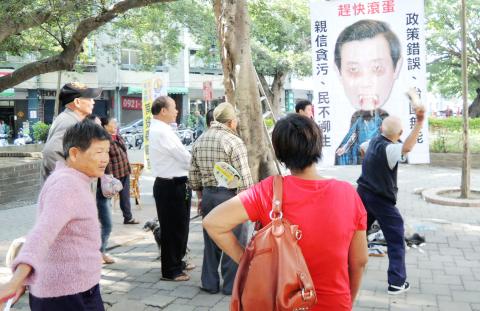|
Majority favor
cross-strait exchanges
BAD TIDINGS: A poll also revealed that the
president’s approval rating is a paltry 14.3 percent, while the premier’s
disapproval rating has reached its highest level yet
By Chris Wang / Staff reporter

Members of the public fling shoes
at a vampire likeness of President Ma Ying-jeou as part of a cathartic Halloween
event organized by the Taiwan Solidarity Union in Nantou County yesterday.
Photo: Hsieh Chieh-yu, Taipei Times
The majority of Taiwanese favor increased
cross-strait exchanges, but appear to be very cautious about a peace agreement
between Taiwan and China, the results of a public opinion poll released
yesterday showed.
Asked if they support the signing of a bilateral peace agreement, with President
Ma Ying-jeou (馬英九) pledging “10 guarantees” in 2011, almost 70 percent of the
respondents in a poll conducted by Taiwan Indicators Survey Research (TISR) said
negotiations for such an accord should not begin before receiving authorization
from a national referendum.
The poll found that 26.8 percent of respondents said negotiations should only
begin after a referendum, 17.1 percent said the government should negotiate
first and put the result to a referendum, and 41.5 percent said that both the
beginning of negotiations and the results should be authorized by referendums.
“That means a total of 68.3 percent of those polled would grant a go-ahead to
negotiations for a peace deal only after a national referendum,” TISR general
manager Tai Li-an (戴立安) said in a press release.
Approximately the same percentage of respondents, 67.9 percent, opposed the
notion that if a cross-strait peace pact was signed, unification with China
should be recognized as a national goal, with 17.2 percent supportive and 15
percent declining to provide an answer.
In a question that allowed respondents to make multiple choices, most expressed
support for increased bilateral exchanges, including mutual visits by officials
of the Mainland Affairs Council and China’s Taiwan Affairs Office (60.2
percent), the establishment of representative offices on each other’s territory
(57.5 percent) and shortening Chinese spouses’ waiting period for identification
cards from six years to four (52.4 percent).
The support rate for trade pacts were lower, with 35.2 percent of those polled
supporting a cross-strait trade in goods agreement and 31.8 percent supportive
of the service trade pact, which was signed in June.
The respondents’ reaction to the order of priority between the service trade
agreement and the trade in goods agreement, which is yet to be signed, appeared
to be split, with 36.2 percent saying that the trade in goods pact could be
signed before the current dispute over the service trade pact is settled, 42.7
percent opposing the proposal and 22.8 percent declining to answer.
The poll found Ma’s approval rating remained low at 14.3 percent, while his
disapproval rating was 71.7 percent.
“A notable fact was that Ma’s disapproval rating was around 80 percent among
respondents between 20 and 49 years old,” Tai said.
Premier Jiang Yi-huah’s (江宜樺) disapproval rating of 58.6 percent was the highest
since he assumed the post in February, according to the poll.
The survey, conducted between Monday and Tuesday, collected 1,007 valid samples
and had a margin of error of 3.1 percentage points.
|
![]()
![]()